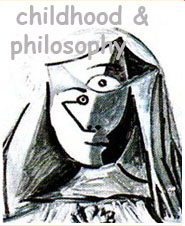elaborating "dialogue" in communities of inquiry: attention to discourse as a method for facilitating dialogue across difference
Mots-clés :
dialogue, communities of inquiry, epistemic openness, discourseRésumé
In communities of inquiry, dialogue is central as both the means and the outcome of collective inquiry. Indeed, features of dialogue—including formulating and asking questions, developing hypotheses and explanations, and offering and requesting reasons—are often highlighted as playing a significant role in the quality of the dialogue that unfolds. We inquire further into the quality of dialogue by arguing that dialogue should enable the expansion of epistemic openness, rather than its contraction, and that this is especially important in multicultural communities of inquiry to acknowledge the cultural, perspectival, and experiential differences that exist alongside of similarities as resources for dialogue. The purpose of this article is to highlight two discourse practices that exemplify the nature of discourse as social practice and can be used in communities of inquiry. Attending to these discourse practices may enable teachers and students to reflect upon dialogue as it unfolds. First, we situate ourselves in multicultural classrooms in British Columbia, Canada. Then we articulate three principles of communities of inquiry. Next we describe and exemplify two discourse practices: heteroglossic attunement and lexical awareness. When attended to by teachers and students, 1) heteroglossic attunement enables teachers and students to begin to identify, reflect upon, and discuss the voices and perspectives that are drawn upon as participants inquire together and 2) lexical awareness enables teachers and students to begin to identify their attributions of thinking and feeling to social actors and to recognize how naming social actors positions them in an evolving set of social relations. Rather than a neutral medium of communication, social speech and dialogue is inherently value laden. Attending closely to the discourse that constitutes dialogue in a community of inquiry is a significant pedagogical tool for both teachers and students to expand epistemic openness and make visible learning as it unfolds.Téléchargements
Les données relatives au téléchargement ne sont pas encore disponibles.
Téléchargements
Publiée
2015-11-30
Numéro
Rubrique
articles




